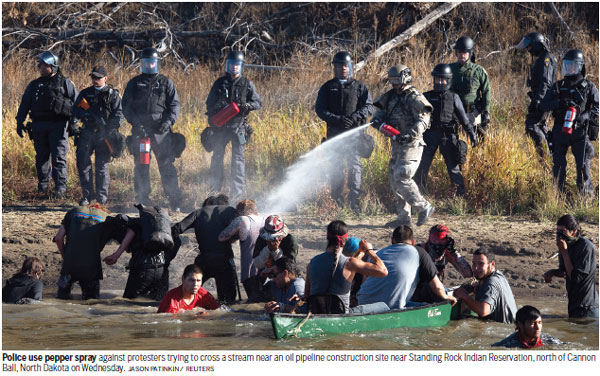Obama: 'mulling' other pipeline routes
By Reuters (China Daily USA) Updated: 2016-11-03 10:46President Barack Obama said the US government is examining ways to reroute an oil pipeline in North Dakota as it addresses concerns raised by Native American tribes protesting against its construction.
Obama's comments late on Tuesday to online news site Now This were his first to directly address the escalating clashes between local authorities and protesters over Energy Transfer Partners' $3.8 billion Dakota Access pipeline project.
"My view is that there is a way for us to accommodate sacred lands of Native Americans. And I think that right now the Army Corps is examining whether there are ways to reroute this pipeline," Obama said in the video interview.
The US Department of Justice did not comment on Obama's statement regarding rerouting the line, citing pending litigation involving the tribes and an ongoing review of permitting by the US Army Corps of Engineers.
"Ultimately, this is a determination the Army must make based on its own review, and we don't yet know what that decision will be," a Justice Department spokesman said.
On Wednesday, protesters on the banks of the Cantapeta Creek confronted law enforcement, as they attempted to build a wooden pedestrian bridge across the creek to gain access to the Cannon Ball Ranch, private land owned by ETP, according to a statement from Morton County officials.
The US Justice and Interior departments along with the Army Corps of Engineers halted construction on part of the pipeline in September due to protests by Native American tribes who contend the pipeline would disturb sacred land and pollute waterways supplying nearby homes.
The affected area includes land under Lake Oahe, a large and culturally important reservoir on the Missouri River where the line was supposed to cross. The Army Corps of Engineers confirmed Wednesday that it let law enforcement go into this land to prevent further campsites from being set up.
Construction is continuing on sections of the pipeline away from the Missouri River, according to one of the owners of the pipeline and also to US refiner Phillips 66.
The 1,172-mile pipeline, being built by a group of companies led by Energy Transfer Partners, would offer the fastest and most direct route to bring Bakken shale oil from North Dakota to US Gulf Coast refineries.
North Dakota officials are bracing for a long fight. The state's emergency commission on Tuesday approved another $4 million loan to support law enforcement during the protests.

- 'Cooperation is complementary'
- Worldwide manhunt nets 50th fugitive
- China-Japan meet seeks cooperation
- Agency ensuring natural gas supply
- Global manhunt sees China catch its 50th fugitive
- Call for 'Red Boat Spirit' a noble goal, official says
- China 'open to world' of foreign talent
- Free trade studies agreed on as Li meets with Canadian PM Trudeau
- Emojis on austerity rules from top anti-graft authority go viral
- Xi: All aboard internet express











